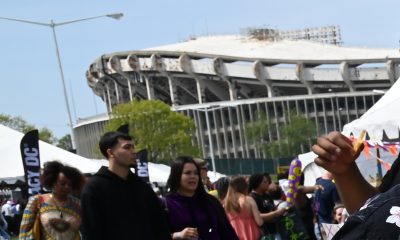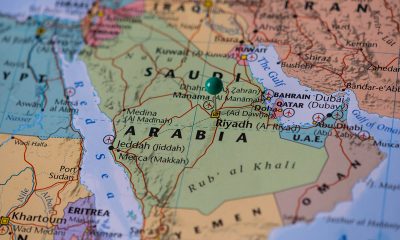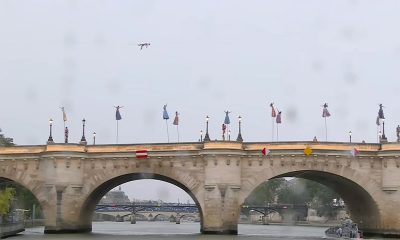Sports
Gay Games-OutGames plan to merge
Leaders of two LGBT sports groups eye ‘One World Event’ in 2022
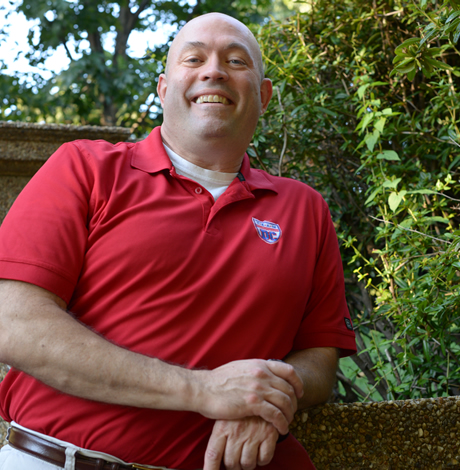
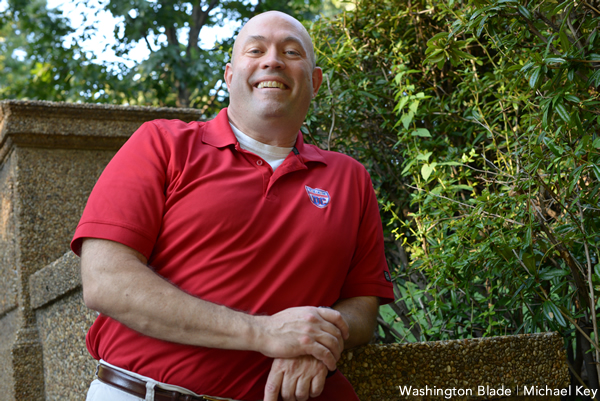
‘It’s going to take a great deal of compromise,’ said Brent Minor of Team D.C. regarding the potential merger of Gay Games and OutGames. (Washington Blade photo by Michael Key)
Leaders of the two quadrennial LGBT international sports competitions – the Gay Games and the World OutGames – signed a memorandum of understanding in May establishing what they say is a preliminary framework for merging the events in 2022.
Officials with the Federation of Gay Games (FGG) and the Gay and Lesbian International Sports Association (GLISA), which organizes the OutGames, said the decision to move ahead with plans for a merger was prompted by the results of a widely distributed online survey of members of both organizations.
According to the officials, the more than 2,000 responses to the survey showed that 88.7 percent of respondents support having a single quadrennial sports, human rights and cultural event in 2022.
The Gay Games were first held in San Francisco in 1982 after gay Olympics athlete Tom Waddell, who is credited with founding the event, was forced to drop the name he first envisioned, the “Gay Olympics,” after the International Olympics Committee insisted it held exclusive legal rights the Olympics name.
The Gay Games continued every four years since its founding year in San Francisco, attracting thousands of LGBT athletes and spectators in cities in North America and Europe as the sole international LGBT sporting competition until 2006, when the first World OutGames competition was held in Montreal.
The OutGames first emerged two years earlier, in 2004, when an irreconcilable disagreement surfaced between the FGG and the group it initially selected to organize the Gay Games in Montreal for 2006. After protracted and sometimes acrimonious negotiations failed, the Montreal organizers broke away from the FGG and announced they would organize their own event in Montreal called the OutGames.
The FGG then reopened the bidding process for another city to host the Gay Games, and Chicago was selected as the new host city. Both events took place within a week of each other in the summer of 2006, and two international quadrennial LGBT sports events have been held ever since.
Nearly all of the dual events have attracted far fewer athletes and spectators than the Gay Games had attracted for its events prior to the split.
“They have to come together with one event because having two events has really hurt both events, and the community wants just one quadrennial event to focus on,” said Cyd Zeigler, co-founder of OutSports Blog, a highly regarded online publication about LGBT sports issues.
“The real question is what does it look like and what is it called,” Zeigler told the Washington Blade. “And for me, it would be such a shame to lose the name Gay Games.”
Zeigler and others supportive of the Gay Games say the Gay Games name and brand have become an important part of the LGBT community’s history and should be preserved.
Among those agreeing with Zeigler is Jessica Waddell Lewinstein, the daughter of the late Gay Games founder Tom Waddell. However, unlike Zeigler, who favors a merger, Lewinstein has come out strongly against the proposed merger as disclosed by the two groups.
“In general, I’m totally open to merging two events, if it is done properly and makes sense, but I’m not seeing anything that tells me that this is one of those situations,” she told the Windy City Times in July.
Officials with the FGG and GLISA have been cautious about publicly discussing potential stumbling blocks to a merger agreement, saying instead that the memorandum of understanding is a work in progress. Both sides have said they are hopeful that a final agreement can be reached because their respective members and supporters strongly favor a single LGBT international sports event.
“All of us at the FGG are extremely thrilled to see things moving forward in a positive manner,” said FGG Co-President Kurt Dahl in a statement in March.
“GLISA is excited on the progress of this vital collaboration that benefits the worldwide LGBT sporting community, GLISA Co-President Tamara Adrian said at the same time.
The memorandum of understanding calls for following recommendations and proposals established by representatives of both groups during a meeting earlier this year in Cologne, Germany in which a lengthy and detailed document referred to as the Cologne Report was drafted and approved.
Among other things, the MOU provides for the creation of a Transition Commission, which will “steer the development of a single organizational body to deliver future One World Events,” a statement released by the two groups says.
Officials on both sides have also said that a merger of the FGG and GLISA is just one of several options under consideration. A single World Event, as the two sides refer to a merged LGBT sports competition, could also be put together by the creation of a newly created entity separate from the FGG and GLISA, officials with the two groups have said.
A One World event could not be held any sooner than 2022, the officials have said, because plans for the next Gay Games and World OutGames are already solidified. The next World OutGames is set to take place in Miami in 2017. The next Gay Games is slated to take place in Paris in 2018.
Meanwhile, an official Working Group consisting of representatives of the FGG and GLISA has been conferring with LGBT sports organizations in North America and Europe to obtain input on the best ways to bring about a merger of the two events.
“We hosted a town hall meeting in June with representatives of the working group,” said Brent Minor, president of Team D.C., an umbrella group representing D.C.-area LGBT sports groups and teams.
Among those participating in the meeting was Les Johnson, an FGG board member from D.C.
“It is clearly a desire among U.S. sports groups to have something in 2022,” Minor said. “That is the goal. A lot of people feel that way,” he said. “The key is can these two organizations that have been estranged come together for one event? It will require compromise.”
Minor said that in addition to the issue of what the joint event should be called, the two sides remain divided over whether a human rights conference should be a major component of the 2022 event and all those that follow. The OutGames organizers have long favored and included in their event such a conference.
Minor, who has been a longtime supporter of the Gay Games, said the Gay Games side doesn’t think such a conference is essential to a quadrennial LGBT sports competition.
“We all want it to be a sports and cultural event,” he said. “We think sports should be the primary focus.”
But Minor added that Team D.C. officials are hopeful that the talks will be successful because uniting the two organizations to hold a single international event is in the best interests of the LGBT community.
“It’s going to take a great deal of compromise,” he said.
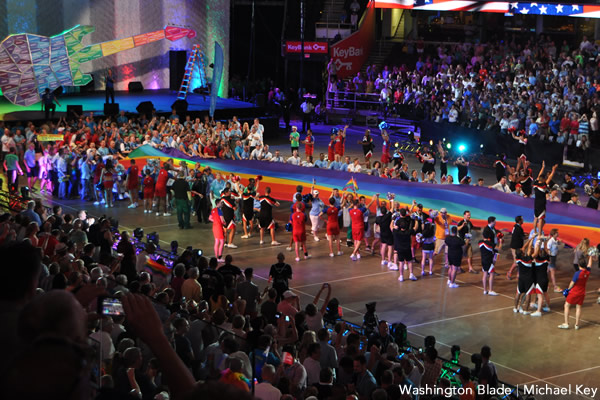
The Opening Ceremony to the 2014 International Gay Games was held at Quicken Loans Arena in Cleveland. (Washington Blade photo by Michael Key.
Sports
Trans cyclist’s victory sparks outrage in conservative media
Katheryn Phillips is originally from DC
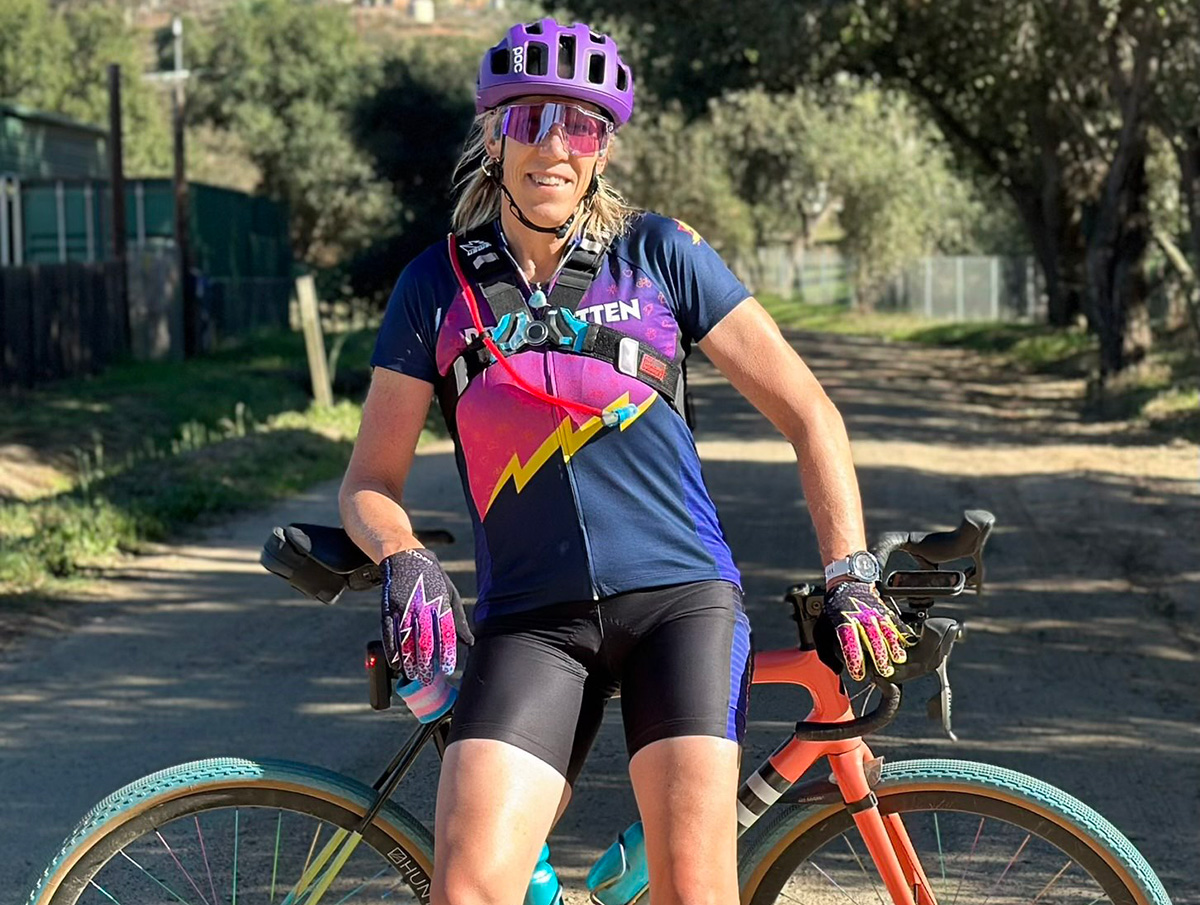
On the heels of UPenn erasing the record of the first openly transgender NCAA Division I All-American swimmer and the U.S. Supreme Court’s decision to tackle bans on trans student-athletes, right wing media is now all hot and bothered about the latest trans woman who won a cycling championship — even though she competed according to the rules.
On Tuesday, 58-year-old Katheryn Phillips finished first in USA Cycling’s Lyons Masters National Championship race for women aged 55-59, with a time of 1:42:10, according to the official results posted by the organization. The record shows her gender as “F” for female.
One second behind Phillips was Julie Peterson, with a time of 1:42:11 — as were three other cyclists: Mary Beth Grier, Andrea Cherniak-Tyson, and Carolyn Maddox.
Peterson, 57, was so outraged, she told Fox News she refused to stand on the podium in second place next to Phillips. Her story was swiftly shared by the New York Post (also owned by Fox’s parent company News Corp.), the Daily Mail, Breitbart, and other conservative media.
Both Peterson and another competitor are accusing USA Cycling of “hiding” that a transgender woman had registered to race.
“It was hidden from us. Katheryn Phillips, KJ’s name, was not on that list. And I checked it up all the way to the point of closure when we couldn’t register online anymore,” Debbie Milne told Fox.
“If I had known, I wouldn’t have spent thousands of dollars in travel and time off work to come and do a race,” Peterson said. Fox welcomed Milne, 56, who finished seventh on Tuesday, to Fox & Friends Thursday morning.
(Video courtesy of Fox News)
Peterson told Fox she did complain to USA Cycling officials prior to the race. Both Milne and Peterson referred to Phillips as a male, and with “he/him” pronouns.
“To be fair to all humans, if we want to say ‘him’ or ‘her,’ he was born a biological male, that is a fact,” Milne said. “And that is the thing that makes it an unfair advantage. Whatever has happened after that is a whole different topic.”
“I said, ‘I don’t want to race against a man,’ and they quickly scolded me and said ‘Oh, you can’t call him a man,’ and I’m like ‘Well, he is a man,’ so I was quickly scolded and corrected that it is a woman and I don’t even know what to say.”
USA Cycling did not respond to the Washington Blade’s emails requesting comment.
Phillips, who goes by Kate and by “KJ,” is a former rugby player with the D.C. Furies, who stated in the comments of a 2024 article published by Zwift Insider that she was the first out trans athlete in the U.S. to compete under the 2004 International Olympic Committee’s guidelines on trans participation.
“When USA Rugby told me about the IOC decision in 2004, I raised my hand to be included. I experience nothing but joy when I play, ride, and race,” Phillips said.
As the Blade has reported, the International Olympic Committee drastically revised those rules in 2021, and in March, Republican lawmakers in D.C. demanded the IOC ban trans female athletes from women’s sporting events altogether.
The Blade also reached out to Phillips for comment but as of press time we have not received a response. She told Zwift Insider in March 2024 she does not let those who disapprove or spread hate impact her performance or her attitude.
“I am unaffected by dissent. I love, I share joy, I am me, and I have been my authentic self for decades,” she said. It’s been reported Phillips came out in 1999, and told Zwift Insider she considers herself a lifelong cyclist.
“I’ve been on a bike for as long as I can remember,” said Phillips. “As kids, my friends and I rode all over town, we were feral kids; no cell phones, no trackers … we just roamed, and nobody got in trouble or hurt bad enough not to ride home … Scrapes/bruises/cuts were not an issue for us. In my teens, I worked for myself as a court/legal messenger, doing all of the work via my bike until I got a car. Raced BMX as a kiddo (when I mowed lawns to cover the race entry fees), I did MTB stuff (non-racing) and Sprint/Olympic Triathlons in my 30’s, and now I’m racing on Zwift, Road/Gravel, and CX in my 50s.”
In the comments section, Phillips made clear she’s not competing to win.
“I don’t do sports for victory, I do it because like many other women, I am an athlete to my core,” she said. “Unlike some, I am not there to WIN, I am there to do my best with the competitors and teammates I have around me trying to do the same…we are in it for the experience. I rejoice in their wins, and a lot of joy is reflected back to me when I have a good day.”
India
Anaya Bangar challenges ban on trans women in female cricket teams
Former Indian cricketer Sanjay Bangar’s daughter has received support

Anaya Bangar, the daughter of former Indian cricketer Sanjay Bangar, has partnered with the Manchester Metropolitan University Institute of Sport in the U.K. to assess her physiological profile following her gender-affirming surgery and undergoing hormone replacement therapy.
From January to March 2025, the 23-year-old underwent an eight-week research project that measured her glucose levels, oxygen uptake, muscle mass, strength, and endurance after extensive training.
The results, shared via Instagram, revealed her metrics align with those of cisgender female athletes, positioning her as eligible for women’s cricket under current scientific standards. Bangar’s findings challenge the International Cricket Council’s 2023 ban on transgender athletes in women’s cricket, prompting her to call for a science-based dialogue with the Board of Control for Cricket in India and the ICC to reform policies for trans inclusion.
“I am talking with scientific evidence in my hand,” Bangar said in an interview posted to her Instagram page. “So, I hope, this makes an impact and I will be hoping to BCCI and ICC talking with me and discussing this further.”
On Nov. 21, 2023, the ICC enacted a controversial policy barring trans women from international women’s cricket. Finalized after a board meeting in Ahmedabad, India, the regulation prohibits any trans player who has experienced male puberty from competing, irrespective of gender-affirming surgery or hormone therapy. Developed through a 9-month consultation led by the ICC’s Medical Advisory Committee, the rule aims to safeguard the “integrity, safety, and fairness” of women’s cricket but has drawn criticism for excluding athletes like Canada’s Danielle McGahey, the first trans woman to play internationally. The policy, which allows domestic boards to set their own rules, is slated for review by November 2025.
Bangar shared a document on social media verifying her participation in a physiological study at the Manchester Metropolitan University Institute of Sport, conducted from Jan. 20 to March 3, 2025, focused on cricket performance. The report confirmed that her vital metrics — including hemoglobin, blood glucose, peak power, and mean power — aligned with those of cisgender female athletes. Initially, her fasting blood glucose measured 6.1 mmol/L, slightly above the typical non-diabetic range of 4.0–5.9 mmol/L, but subsequent tests showed it normalized, reinforcing the study’s findings that her physical profile meets female athletic standards.
“I am submitting this to the BCCI and ICC, with full transparency and hope,” said Bangar. “My only intention is to start a conversation based on facts not fear. To build space, not divide it.”
In a letter to the BCCI and the ICC, Bangar emphasized her test results from the Manchester Metropolitan University study. She explained that the research aimed to assess how hormone therapy had influenced her strength, stamina, hemoglobin, glucose levels, and overall performance, benchmarked directly against cisgender female athletic standards.
Bangar’s letter to the BCCI and the ICC clarified the Manchester study was not intended as a political statement but as a catalyst for a science-driven dialogue on fairness and inclusion in cricket. She emphasized the importance of prioritizing empirical data over assumptions to shape equitable policies for trans athletes in the sport.
Bangar urged the BCCI, the world’s most influential cricket authority, to initiate a formal dialogue on trans women’s inclusion in women’s cricket, rooted in medical science, performance metrics, and ethical fairness. She called for the exploration of eligibility pathways based on sport-specific criteria, such as hemoglobin thresholds, testosterone suppression timelines, and standardized performance testing. Additionally, she advocated for collaboration with experts, athletes, and legal advisors to develop policies that balance inclusivity with competitive integrity.
“I am releasing my report and story publicly not for sympathy, but for truth. Because inclusion does not mean ignoring fairness, it means measuring it, transparently and responsibly,” said Bangar in a letter to the BCCI. “I would deeply appreciate the opportunity to meet with you or a representative of the BCCI or ICC to present my findings, discuss possible policy pathways, and work towards a future where every athlete is evaluated based on real data, not outdated perceptions.”
Before her transition, Bangar competed for Islam Gymkhana in Mumbai and Hinckley Cricket Club in the U.K., showcasing her talent in domestic cricket circuits. Her father, Sanjay Bangar, was a dependable all-rounder for the Indian national cricket team from 2001 to 2004, playing 12 test matches and 15 One Day Internationals. He later served as a batting coach for the Indian team from 2014 to 2019, contributing to its strategic development.
Cricket in India is a cultural phenomenon, commanding a fanbase of more than 1 billion, with more than 80 percent of global cricket viewership originating from the country.
The International Cricket Council, the sport’s governing body, oversees 12 full member nations and more than 90 associate members, with the U.S. recently gaining associate member status in 2019 and co-hosting the 2024 ICC Men’s T20 World Cup. The BCCI generated approximately $2.25 billion in revenue in the 2023–24 financial year, primarily from the Indian Premier League, bilateral series, and ICC revenue sharing. The ICC earns over $3 billion from media rights in India alone for the 2024–27 cycle, contributing nearly 90 percent of its global media rights revenue, with the BCCI receiving 38.5 percent of the ICC’s annual earnings, approximately $231 million per year.
Women’s cricket in India enjoys a growing fanbase, with over 300 million viewers for the Women’s Premier League in 2024, making it a significant driver of the sport’s global popularity. The International Cricket Council oversees women’s cricket in 12 full member nations and over 90 associate members, with the U.S. fielding a women’s team since gaining associate status in 2019 and competing in ICC events like the 2024 Women’s T20 World Cup qualifiers. The BCCI invests heavily in women’s cricket, allocating approximately $60 million annually to the WPL and domestic programs in 2024–25, while contributing to the ICC’s $20 million budget for women’s cricket development globally. India’s media market for women’s cricket, including WPL broadcasting rights, generated $120 million in 2024, accounting for over 50 percent of the ICC’s women’s cricket media revenue.
“As a woman, I feel when someone says that they are women, then they are, be trans or cis. A trans woman is definitely the same as a cis woman emotionally and in vitals, and specially, when someone is on hormone replacement therapy. Stopping Anaya Bangar from playing is discrimination and violation of her rights. It is really sad and painful that every trans woman need to fight and prove their identity everywhere,” said Indrani Chakraborty, an LGBTQ rights activist and a mother of a trans woman. “If ICC and BCCI is stopping her from playing for being transgender, then I will say this to be their lack of awareness and of course the social mindsets which deny acceptance.”
Chakraborty told the Blade that Bangar is an asset, no matter what. She said that the women’s cricket team will only benefit by participation, but the discriminating policies are the hindrance.
“Actually the transgender community face such discrimination in every sphere. In spite of being potent, they face rejection. This is highly inhuman. These attitudes is regressive and will never let to prosper. Are we really in 2025?,” said Chakraborty. “We, our mindset and the society are the issues. We, as a whole, need to get aware and have to come together for getting justice for Anaya. If today, we remain silent, the entire community will be oppressed. Proper knowledge of gender issues need to be understood.”
The BCCI and the International Cricket Council have not responded to the Blade’s repeated requests for comment.
Sports
English soccer bans transgender women from women’s teams
British Supreme Court last month ruled legal definition of woman limited to ‘biological women’
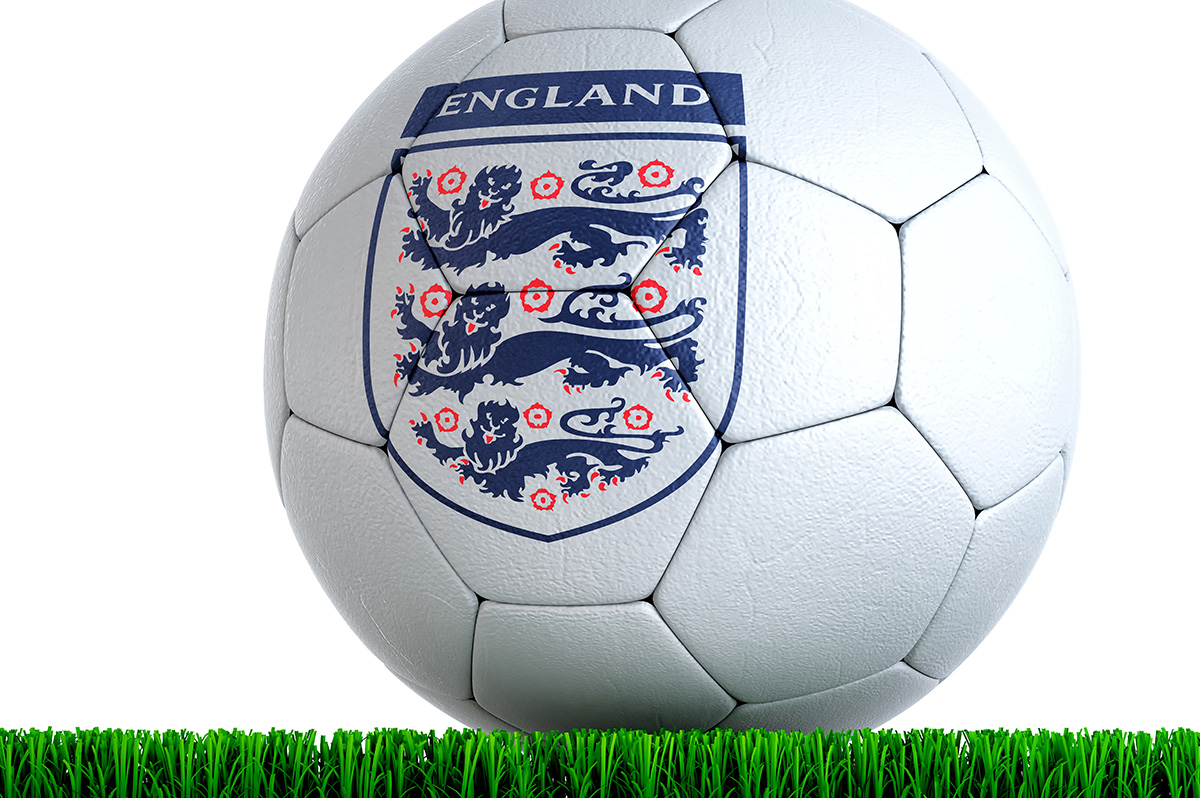
The organization that governs English soccer on Thursday announced it will no longer allow transgender women to play on women’s teams.
The British Supreme Court on April 16 ruled the legal definition of a woman is limited to “biological women” and does not include trans women. The Football Association’s announcement, which cites the ruling, notes its new policy will take effect on June 1.
“As the governing body of the national sport, our role is to make football accessible to as many people as possible, operating within the law and international football policy defined by UEFA (Union of European Football Associations) and FIFA,” said the Football Association in a statement that announced the policy change. “Our current policy, which allows transgender women to participate in the women’s game, was based on this principle and supported by expert legal advice.”
“This is a complex subject, and our position has always been that if there was a material change in law, science, or the operation of the policy in grassroots football then we would review it and change it if necessary,” added the Football Association.
The Football Association also acknowledged the new policy “will be difficult for people who simply want to play the game they love in the gender by which they identify.”
“We are contacting the registered transgender women currently playing to explain the changes and how they can continue to stay involved in the game,” it said.
The Football Association told the BBC there were “fewer than 30 transgender women registered among millions of amateur players” and there are “no registered transgender women in the professional game” in England, Scotland, Wales, and Northern Ireland.
The Scottish Football Association, which governs soccer in Scotland, is expected to also ban trans women from women’s teams.

